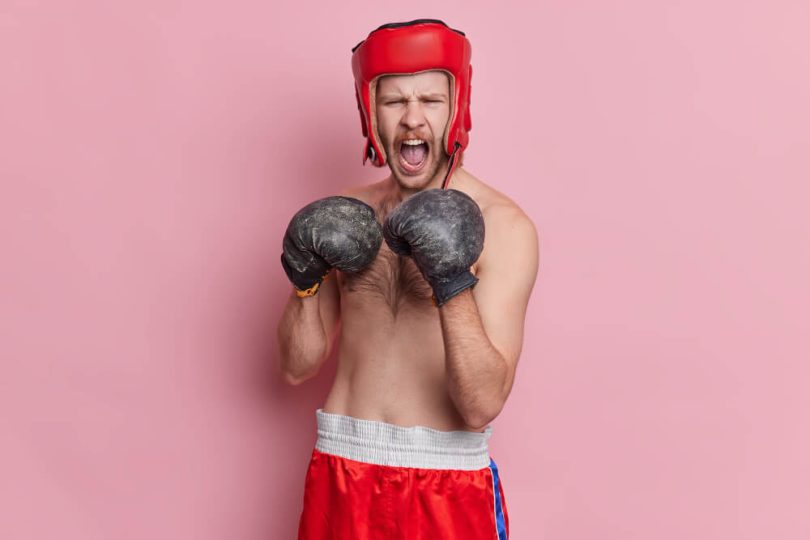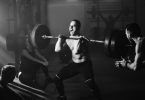Why Are Boxers So Skinny?
Many boxing fans believe that the most talented fighters are those who have well-developed muscles all over their body and large biceps. They incorrectly believe that having a large frame confers the kind of fighting strength that is necessary, yet this is often not the case.
Skinny boxers can be attributed to the high-repetition workouts that make up the bulk of their training. Boxers, for instance, would rather do 100 push-ups than 400 squats. High-repetition training does not help boxers gain muscular mass, but it does help them avoid muscle exhaustion.
Fastness, agility, and stamina are the keys to success in boxing. It’s also worth noting that boxing is one of the few sports where bulking up isn’t an asset and can work against you. Because of the importance of conditioning, boxers typically have a lean body type.
In this post, we’ll dive deeper into the topic of why many boxers are skinny: having massive muscles hinders their physical ability.
Muscle Endurance Is More Important Than Muscle Growth
Boxing, like the marathon, is a test of stamina. It’s important to train your body to withstand the rigors of five rounds of intense combat by building muscle endurance.
This is why, instead of trying to bench press 400 pounds a few times, boxers instead engage in high repetition routines like 100 pushups.
High repetition training does not promote significant muscle growth, but it does increase muscular endurance and decrease the likelihood that muscles will weary during your workout.
They avoid being too heavy and instead work on developing strong muscle endurance while maintaining a relatively low body fat percentage (approximately 5-9%). Every single fighter out there would rather have less muscle mass because it increases their stamina in the ring.
For another example of this in action, consider the following. Anaerobic sports, such as powerlifting and football, benefit greatly from the explosive strength that comes from having a lot of muscle.
They let you exert maximum force in minimum time, whether you’re trying to lift a hefty weight or run the 100-meter dash at top speed. Boxing, though, is all about stamina and accuracy, not brute force alone.
Boxing is an alternative sport that requires sustained high performance. Boxers, instead of bulking up, train for muscle endurance, which leaves them slim and shredded. With such a slim build, they can give it their all in every game without suffering any noticeable performance drops.
Picture yourself running as fast as you can across a field. You’d probably be worn out. Then picture yourself running across the field as the tiger closes up behind you. You would be completely spent after dealing with the terror, adrenaline, and physical exertion of running. That’s the situation a martial artist enters into every time he competes.
Big Muscles Burn Up Oxygen Quicker
Boxers avoid bulking up too much since doing so causes their oxygen to deplete more rapidly. Larger muscles have more oxygen needs.
To generate energy, your muscles require oxygen when you work out…
Consequently, if a fighter were to bulk up with muscle, their heart would have to work considerably harder to provide the increased oxygen demands of those muscles. As a result, your pulse rate spikes throughout the fight, and you run out of air quickly.
Nonetheless, when practicing for a bout, boxers take care to avoid gaining too much muscle. They strike a balance between increasing muscle mass sufficiently for strength gains and maintaining excellent cardiovascular fitness. Additionally, most of them are very conscious of their weight and strive to maintain a low body fat percentage.
If you have a lot of muscle, it won’t help you win in the ring because that puts more strain on your heart, which in turn makes you fatigued more quickly. If having more muscular mass helped boxers win fights, every single one of them would look like a bodybuilder.
Big Muscles Make You Less Flexible And Slower
Having a lot of muscle makes you inflexible and limits your mobility, neither of which are advantageous in boxing. Sure, why not try bulking up a bit? Ok, but you might want to ponder:
Is that how heavy you’re used to your body feeling? Are you accustomed to carrying around such a large amount of weight after the labor rate you were putting in during all of your prior battles?
Having a lot of muscular mass makes it harder to properly execute striking and grappling moves. Boxers, on the other hand, value slimness above flexibility since the former allows them to move more quickly and powerfully. If you’re wondering how having less muscle might make you stronger, read on.
Big muscles don’t necessarily translate to a powerful punch. Each strike is amplified by the rotation of your entire body, especially your legs and hips. A lack of bulk helps a fighter to spin their torso and arms around more quickly, increasing their striking power and quickness.
The same holds for grappling and other forms of ground fighting, where agility is essential. You can move between them more quickly, free yourself from a joint lock or choke, or stand up.
Are Skinny boxers Better In boxing?
According to the available evidence, it appears that boxers who are relatively slim and don’t have a lot of muscle tend to have more success in competition.
Boxers that have a lower body fat percentage typically have a higher rate of foot speed, greater flexibility, and greater endurance. On the other hand, those who have bulky bodies have a greater tendency to tire out early in the fight since larger muscles require a greater amount of oxygen. In addition to this, they move significantly more slowly simply because they have a greater mass to move around.
Boxers with less muscle mass and a solid game plan will always outlive their counterparts who have more bulk. They would also prevail in the majority of the fights that took place on the ground or their feet since they are both quicker and more agile.







